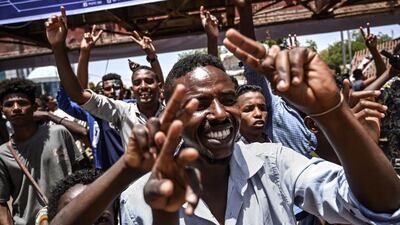The UAE and Saudi Arabia on Sunday announced a $3 billion aid package that includes a $500 million payment by the two countries to the central bank of Sudan.
Sudan has suffered for years under a sluggish economy in which an estimated 70 per cent of government spending went to the security agencies.
The country has been hit by an acute lack of foreign currency, which became a key factor behind the nationwide protests that led to the removal of president Omar Al Bashir by the army this month.
Since December, as the price of staples such as bread rose dramatically, protesters have taken to the streets.
The UAE and Saudi aid package was to strengthen the financial position and ease the pressure on the Sudanese pound, the Saudi Press Agency said.
The shortage of foreign currency made it difficult to import even crucial medicine.
The aid package was also to be spent on urgent needs such as food, medicine and oil.
Sudan lost much of its once large oil reserves in 2011 when South Sudan became independent.
The Sudanese pound surged on the black market on Sunday over expectations that Mr Al Bashir's removal would lead to new inflows of dollars and ease the foreign currency shortage.
Since he was removed, the pound has steadily strengthened on the black market, and on Sunday it jumped to 45 a dollar, compared with 72 last week. The official exchange rate is 47.5 pounds to the dollar.
"Many people who had dollars are coming to exchange them for Sudanese pounds," a black market trader said.
"They feel that more dollars will come, which will strengthen the pound further."
Another black market trader said: "Since Saturday, I had 20 people coming to my shop asking for pounds. Nobody wants dollars."
The Sudanese currency plunged since the US lifted its 20-year trade embargo on the country in October 2017.
Expectations that the end of US sanctions would bring an economic recovery were unrealised, putting pressure on the long-suffering pound.

